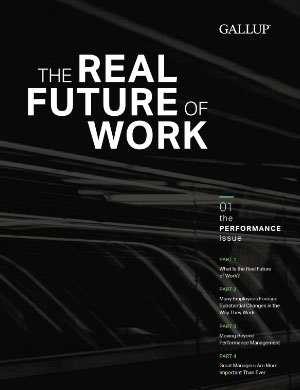Story Highlights
- Pause to reflect on lessons learned amid the COVID-19 crisis
- Position your hiring process and business strategies to thrive
- Focus on performance management to strengthen business development
Many companies are slowly returning to work -- and leaders have been planning how to relaunch their operations and recapture lost business.
As leaders prioritize the emerging recovery phase, they should pause to reflect on the lessons learned throughout the COVID-19 crisis about performance management -- and consider how to use those insights to surge back.
For example, some of your work teams may be tapping into never-before-seen agility and collaboration. They're rapidly responding with new products, services and ways of working that help your business thrive even with limited resources.
In other circumstances, the usually painful decisions about furloughs or layoffs were made simpler because of preexisting performance problems.
This highlights a need for a deeper understanding of talent acquisition and how to manage performance -- and offers powerful learning for leaders who honestly evaluate past shortcomings.
Two Essential Questions Crucial to Your Ideal Future Workplace
Leaders should answer two questions to position their business and talent management strategy to thrive in the days ahead:
- Who are the "right people," those absolutely critical to your past, current and future success?
- Why was there so much range in team member performance (i.e., why was your performance management system not more effective at reducing the variation)?
With these questions in mind, leaders should consider the following two strategies.
Study what differentiates top performers to improve your business development.
Gallup has learned that successful people have a lot of unteachable ability -- they have natural talent that enables them to excel in their particular role. People can learn skills, develop knowledge and gain experience, but they can't acquire talent.
Who are the "right people," those absolutely critical to your past, current and future success?
To build a workforce of all-star talent, leaders should objectively review the range in performance in their organization, particularly in mission-critical activities and in revenue-generating roles. By comparing average performers to top performers, leaders can discover how their most talented employees make decisions, build relationships, influence others and execute their work.
Leaders should focus on exceptional talent -- employees who optimally represent the organization's brand, naturally live out the company values and consistently sustain high performance.
With these insights, leaders can ensure the right people are in the right roles. Too many great employees are not achieving their full potential because they're not in a role that allows them to apply their individual strengths.
Further, leaders can optimize their attraction and selection methods to select and develop world-class contributors who possess the right qualifications and innate talent for the role. For example, do your job descriptions capture excellent or average performance?
Refocus and retune your performance management to excellence.
All employees need a great manager who can coach them to perform with excellence. It's up to leaders to ensure teams have a manager who continually sets clear, motivating expectations; positions employees to do their best; and fosters a culture of accountability, respect and achievement.
Leaders should also objectively evaluate the efficacy of their performance management processes. For example, do those processes provide meaningful employee feedback and incentivize desired behaviors?
On an ongoing basis, leaders should hold managers responsible for developing team members' capability and performance by helping individuals leverage their unique strengths and reach their peak potential.
Leaders should pay close attention to talent fit when considering their recruitment strategy. They should also closely examine whom they name manager, performance management system efficacy and developing employee strengths. Otherwise, they will struggle to identify the causes of subpar delivery and the right solution to address such challenges.
Do your job descriptions capture excellent or average performance?
For many leaders, COVID-19 might pose the most significant business disruption to date. However, this crisis can also enable organizations to be truly lean, performance-oriented and forward-thinking.
By making talent a central people strategy in their hiring process and business strategies, leaders can more effectively support a culture of high performance post-COVID-19. Ultimately, leaders who raise the talent bar are more likely to have more consistent, exceptional performers -- and in turn, best prepare their business for future disruptions.
Learn more about guiding your team through disruption:
- Discover Gallup's learning programs to help leaders and managers drive organizational performance.
- Read more articles like this one.
- Get more insights on our resource page, COVID-19: Leading Through Disruption.





